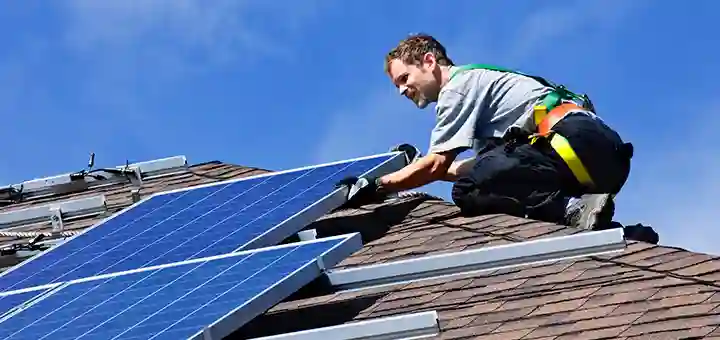In recent years, the adoption of solar panel installations has surged as homeowners seek to reduce their carbon footprint and lower energy costs. One of the key questions that often arises when considering solar panels is whether they have a positive impact on the resale value of a home. In this article, we will explore the various factors that influence the impact of solar panel installations on home resale value, the potential financial benefits for homeowners, and the broader implications for the real estate market.
The Solar Panel Resale Value Equation
The impact of solar panels on a home’s resale value can be influenced by a combination of factors. Here are some key elements to consider:
Location, Location, Location:
-
- Regional Solar Adoption: The impact of solar panels on resale value can vary significantly depending on the region. In areas with high solar adoption rates and strong solar incentives, such as tax credits and rebates, solar panels may have a more substantial positive impact on home value.
- Energy Costs: Regions with high electricity costs may see a greater increase in home resale value due to solar panels, as potential buyers are more motivated to invest in energy-efficient homes.
Energy Savings and Return on Investment:
-
- Energy Savings: Solar panels provide homeowners with the opportunity to generate their electricity, leading to reduced energy bills. The actual savings depend on factors such as system size, electricity consumption, and local electricity rates.
- Return on Investment (ROI): Potential buyers often consider the ROI associated with solar panels. A well-designed and efficiently functioning solar panel system can yield a positive ROI over time, making the home more attractive to buyers.
Quality of Installation:
-
- Professional Installation: A high-quality solar panel installation carried out by a reputable installer can add to the home’s value. Buyers may be more willing to pay a premium for a professionally installed system that comes with warranties and guarantees.
- Aesthetic Integration: The visual appeal and integration of solar panels into the home’s design also play a role. Solar panels that are seamlessly integrated into the roof or property tend to have a more positive impact on home resale value.
Ownership and Financing:
-
- Ownership vs. Leasing: Homeowners who own their solar panel systems outright often see a more significant increase in home resale value compared to those who lease or have power purchase agreements (PPAs). Buyers may be less inclined to assume lease payments or contractual obligations.
- Financing Options: Offering potential buyers attractive financing options for solar panel systems can make the property more appealing. Some homeowners may appreciate the convenience of a solar system that has already been paid off.
Local Real Estate Market Dynamics:
-
- Competitive Advantage: In a competitive real estate market, having solar panels can give a property a competitive advantage over others. Buyers may be more likely to choose a home with solar panels when faced with similar options.
- Homebuyer Awareness: The level of awareness and understanding of the benefits of solar panels among homebuyers in a specific market can influence their willingness to pay more for a home with solar.
Appraisal and Home Valuation:
-
- Appraiser Knowledge: The knowledge and expertise of the appraiser can impact the appraised value of a home with solar panels. It is essential to work with appraisers who are familiar with valuing properties with solar installations.
- Solar Value Added: Some regions have introduced solar-specific appraisal addenda that appraisers can use to accurately assess the value of solar panel systems.
Case Studies: Impact on Home Resale Value
Several studies and real-world examples provide insights into the impact of solar panel installations on home resale value:
- Berkeley Lab Study (2015): A study by the Lawrence Berkeley National Laboratory examined home resale values in various markets across the United States. The research found that, on average, homes with solar panels sold for about $15,000 more than comparable homes without solar installations.
- Zillow Group Study (2019): A study by Zillow Group analyzed home listings and sales data and found that homes with solar panels were more likely to sell at a premium compared to homes without solar. The study reported that solar-equipped homes sold for 4.1% more on average.
- National Renewable Energy Laboratory (NREL): NREL conducted research indicating that homebuyers were willing to pay a premium for solar panel systems that were owned outright by the seller, as opposed to leased or financed through third-party agreements.
- Real-Life Examples: Numerous real estate listings showcase homes with solar panels as a key selling point. In many cases, these homes command higher prices and attract environmentally conscious buyers interested in the long-term energy savings.
Conclusion
The impact of solar panel installations on home resale value is influenced by a combination of factors, including location, energy savings, quality of installation, ownership, local market dynamics, and appraisal processes. While it is challenging to generalize the exact premium that solar panels will add to a home’s resale value, there is substantial evidence suggesting that they can have a positive impact.
For environmentally conscious buyers looking to reduce their carbon footprint and lower long-term energy costs, solar panels are often a desirable feature. Furthermore, as solar technology continues to advance and become more affordable, the attractiveness of solar-equipped homes in the real estate market is likely to grow.
Homeowners considering solar panel installations should research local incentives, choose reputable installers, and carefully evaluate ownership options to maximize the potential impact on their home’s resale value. In an era where sustainability and energy efficiency are increasingly valued, solar panels can be a valuable asset when it comes to selling a home.









